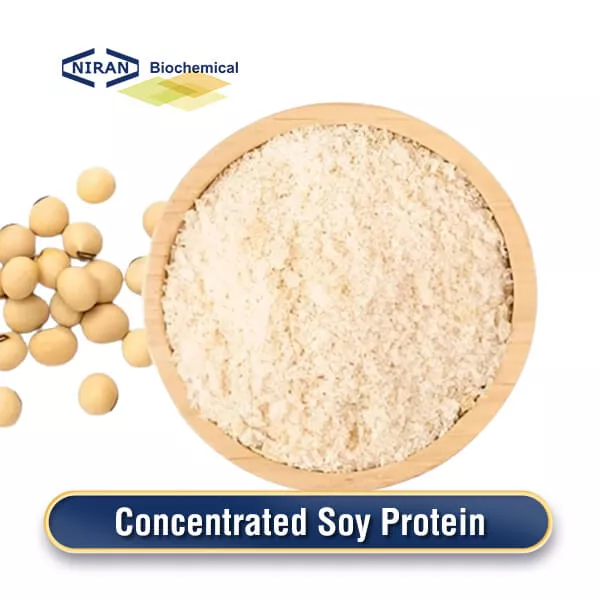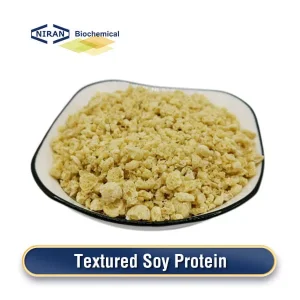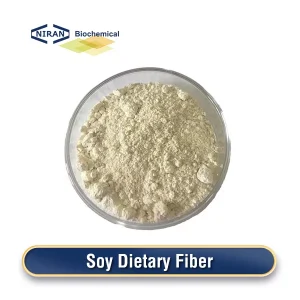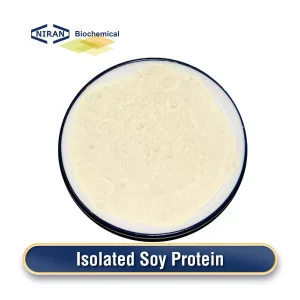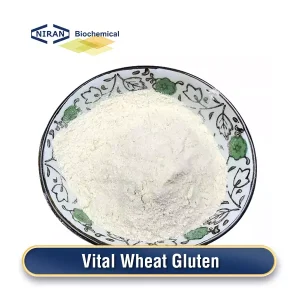Niran Biochemical
YOUR RELIABLE FOOD INGREDIENTS
Send Inquiry
Concentrated Soy Protein
- CAS: 9010-10-0
- Chemical Formula: C13H10N2
- Certification: KOSHER, ISO, HALAL, FSSC22000, BRC, etc.
- MOQ: 1000KG
- Shelf Life: 2 Years
Inquire Product
Product Description
What Is Concentrated Soy Protein?
Concentrated soy protein is a protein extracted from soybeans, which is a protein concentrate obtained by removing some fat and carbohydrates. It has a light yellow powder appearance. It is a high-protein, high-nutrition food ingredient widely used in the food and beverage industry.
There are several main methods for preparing concentrated soy protein:
- Grind the soybeans into a slurry and adjust them to an acidic environment (pH is usually between 4.5 and 5.0) to precipitate protein from the slurry, centrifuge to separate the protein precipitate, then remove the liquid part, adjust the pH value with a neutralizer, and then remove excess water through a concentration process to obtain a concentrated soy protein powder, and finally dry it to obtain the finished product. The process for preparing concentrated soy protein has become a more mainstream production method due to its ability to extract a higher protein content and mature technology.
- Grind the soybeans into a slurry, add specific enzymes (such as proteases) to decompose the non-protein components in the soybeans, increase the protein concentration, separate the protein solution by centrifugation or filtration, remove the liquid part, and then concentrate and dry it to obtain a concentrated soy protein powder.
Grind the soybeans into pulp, use ultrafiltration membrane to separate the protein from other components in the soybean pulp, retain the protein and remove excess water and other impurities, and finally obtain the final concentrated soy protein powder through further concentration and drying process.
Related Parameters:
| Items | Specification |
| Crude Protein (as dry basis) | ≥65% |
| Moisture | ≤7% |
| Ash | ≤6% |
| Fat | ≤1% |
| PH | 6.5-8 |
| Density | 035-038g/cm^3 |
| Particle Size (through 100 mesh) | ≥95% |
| Color | Cream or light cream |
| Bacterial Content (cfu/g) | ≤20,000 |
| E.coli | ≤3MPN/G |
| Yeast and Mould | ≤50CGU/G |
| Coliform Bacteria(MPN/100g) | ≤30 |
| Salmonella | Negative/25g |
| Melamine | Not Detected |
| Cadmium(ppm) | ≤0.1 |
| Arsenic(ppm) | ≤0.5 |
| Lead(ppm) | ≤0.5 |
Recommended Dosage:
| Food name | Maximum usage(g/kg) |
| Protein drinks | 30-50 g/kg |
| Nutritional supplements | 50-70 g/kg |
| Vegetarian burgers | 60-80 g/kg |
| Meat substitutes (e.g. vegetarian patties) | 50-70 g/kg |
| Biscuits | 20-30 g/kg |
| Bread | 10-20 g/kg |
| Protein powder | 70-90 g/kg |
| Patties | 50-70 g/kg |
| Seasonings (e.g. instant seasoning packets) | 10-20 g/kg |
| Vegetarian sausages | 40-60 g/kg |
| Energy drinks | 20-30 g/kg |
| Milkshakes | 30-50 g/kg |
| Hamburgers | 40-60 g/kg |
| French fries (vegetarian version) | 20-30 g/kg |
Concentrated Soy Protein Has A Wide Range Of Uses
- Concentrated soy protein contains up to 65%-75% protein, which is an effective protein source and can significantly increase the protein content of food.
- It can improve the texture of food, making it more meaty or increasing viscosity.
- As a functional ingredient, concentrated soy protein can improve the nutritional function of food, such as increasing satiety and improving blood sugar control.
- Concentrated soy protein helps stabilize other ingredients in food formulations and reduce stratification and precipitation.
- Compared with other high-protein ingredients, concentrated soy protein contains lower fat, which helps reduce the total fat content in food.
User Asked Question:
Q: What are the advantages of concentrated soy protein over soy protein?
A: The main difference between soy protein and concentrated soy protein is that part of the fat and carbohydrates are removed during processing, making the protein content of concentrated soy protein higher, usually between 65% and 70%. Concentrated soy protein has a higher protein density, lower fat and carbohydrate content, can improve the taste and texture of food, and is suitable for food formulations that require high protein and low fat.

